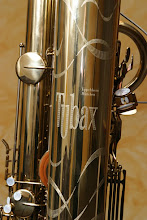2/28/09
1. During this act, it becomes apparent that Lady Macbeth and Macbeth are swapping roles. When the play started out, Lady Macbeth was was vouching for the murder and Macbeth could hardly bring himself to do it, "The fatal entrance of Duncan/ Under my battlements" (1.5.38-39). Here, Lady Macbeth is already planning the murder of Duncan before either he or her own husband have reached her castle. In the second act however, Lady Macbeth shows a little resistance to the murder while later on Macbeth becomes more violent, "That I did kill them" (2.3.109). Here, Macbeth admits to slaying the two guards shortly after the King's men arrived. FInally, in the third act, Macbeth orders the murder of his best friend while Lady Macbeth laments a little over Duncan's murder, "'Tis safer to be that which we destroy/ than by destruction dwell in doubtful joy" (3.2.8-9). Lady Macbeth is basically saying that it would be better if she were dead than living with her guilt (Foreshadowing? I think so!).
2. The first mention of something resembling a candle is a torch, "A light, a light" (3.3.18). The light in question is a torch being carried by Banquo. This torch is symbolic of his life, discernible from how when Banquo utters his last breath, the torch also sputters and dies itself, "Who did strike out the light?" (3.3.25). This quote is just taken from one of the murderers and actually has a little significance because it also implies that Banquo was a "guiding light" and after the light was extinguished, they became a little lost.
3. For this act, the main reoccurring theme is loyalty or lack-there-of. This is seen in several places, and is emphasized by Macbeth's decision to have Banquo murdered, "His throat is cut. That I did for him" (3.4.16). Here Macbeth is receiving confirmation of Banquo's death. Another place this theme pops up is in Lady Macbeth, "You must leave this" (3.3.38). In this quote, she toughens up after feeling depressed and tells her beloved not to worry. The devotion she shows to her husband is a form of loyalty. The final place where loyalty is exemplified is when Lennox and some other lord are discussing their loyalty to Duncan/ Malcolm, "The son of Duncan, from whom this tyrant holds the due of birth" (3.6.24-25). Here, they are labeling Macbeth as a tyrant and rejecting his title as King. This act all in all seems to cover 3 of the most importan kinds of loyalty, loyalty towards: Friends (Or lack-there-of in Macbeth's case), family (Lady Macbeth), and country (Lennox).
Subscribe to:
Post Comments (Atom)

No comments:
Post a Comment